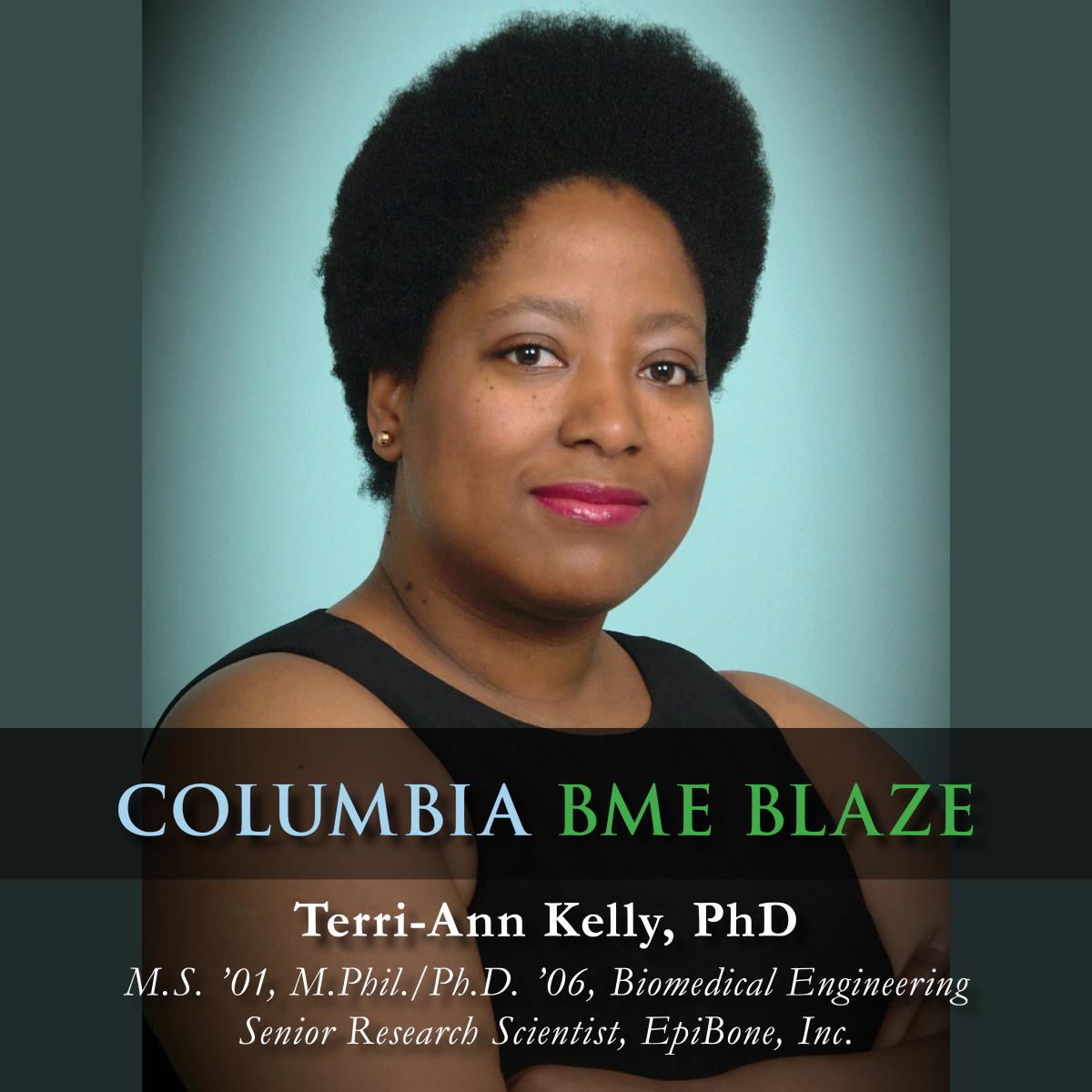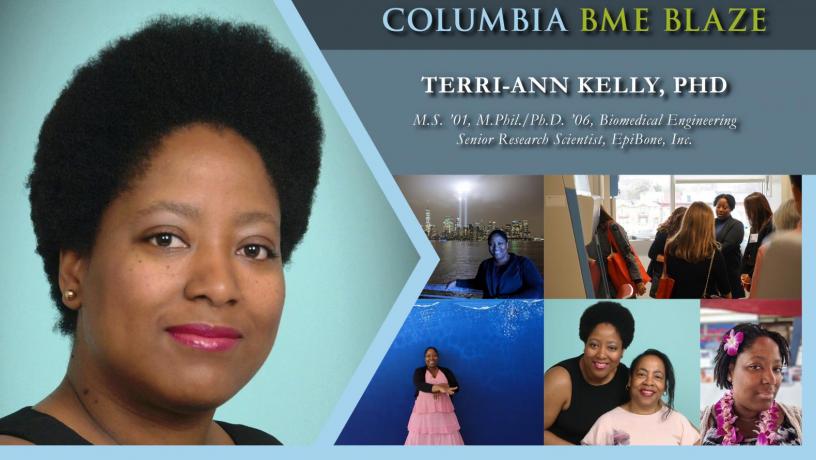March 2021 - BME Blaze: Terri-Ann Kelly
In this monthly spotlight, get to know the alumni and students of Columbia's Department of Biomedical Engineering. Read what our BME folks are up to, from our labs' latest research, to our students' plans for the future, to our teams' innovations, start-ups and other career successes.
We loved catching up with Columbia BME graduate alumna Terri-Ann Kelly (MS '01; MPhil/PhD '06), as she discussed her academic journey and beyond. Read below to get to know Terri-Ann!

Terri-Ann Kelly, PhD
M.S. ’01, M.Phil./Ph.D. ’06, Biomedical Engineering (Tissue Engineering track)
Where are you from?
I was born in Kingston, Jamaica. I grew up in Portmore, Jamaica until I moved to the Springfield, MA when I was around 11 years old.
What is your current position?
I am the Senior Research Scientist at EpiBone, Inc. I lead the development of EpiBone’s osteochondral product as well as provide my expertise in cartilage tissue engineering.
Tell us about your family. Who has/have been your strongest influence(s) in life?
I grew up in a large family with 2 brothers and 4 sisters. Growing up, my mom was the biggest influence in my life. Education was very important to my mother. She put herself through college while I was in junior high school and high school, while maintaining a full-time job and taking care of us. She went on to get her MBA while I was in college. Her struggles with getting an education were my biggest inspiration for pursuing my own education.
How did you become interested in STEM research and, more specifically, in biomedical engineering?
I have always excelled in math and the sciences. During high school, my Physics teacher got me involved in the Science Olympiad. He saw that I had an affinity toward biology and chemistry, so I was usually assigned to those events. I was first introduced to Biomedical Engineering though one of the projects.
Why did you choose Columbia BME?
After receiving my acceptance letters, I was trying to choose between a few schools when Prof. Clark Hung contacted me. He pointed out that my background made me a great candidate for the Tissue Engineering track. After doing some research into Tissue Engineering, I was very intrigued, so I decided to visit the department with my parents. In the end, I chose Columbia BME because of that personal touch.
What were some of your favorite projects/memories from the program?
My favorite memories are of working in the lab with my fellow classmates. I thoroughly enjoyed the collaborative environment that Columbia BME fosters. I got the opportunity to meet many interesting people, many of whom I still consider friends.
What are your thoughts on the strength of Columbia BME's alumni network and how has that influenced your career path?
During my final months in the Columbia BME department, I met fellow graduate student, Nina Tandon, through a mutual friend. Years later, through my Columbia BME network, I had the opportunity to work in London. It was also through this network that I learned about EpiBone, and eventually ended up working for the company.
Tell us about your experience as an Afro-Caribbean professional in STEM.
Being a black female is STEM has always been a challenging and often lonely endeavor. I went to a mostly white college followed by a graduate school in a mostly white and Asian environment. I experienced a lot of racist and sexist comments from my coworkers, classmates, and professors. I often had to work harder to prove my qualifications when surrounded by my peers.
My network outside of academia was always important for me. At WPI, I was a student leader in the Excellence in Mathematics Science and Engineering Program (EMSEP, which provides a support system to Black, Latino, and American Indian students), the Black Student Union, the Hispanic Students Association, the National Society of Black Engineers, and the Society of Professional Engineering. During grad school, I had a diverse network of friends both at Columbia and outside the university. These relationships with like-minded individuals and allies, as well as my family, were instrumental in supporting my STEM career.
What accomplishment(s) are you most proud of, and what do you hope to accomplish in the future?
My biggest accomplishment was defying societal expectations of my gender and race and earning my PhD. I hope to get more involved in outreach to help other minorities accomplish their dreams.
What advice would you give to others who wish to pursue a degree and/or career in BME?
Never give up on yourself or your dreams. Build your own support network to help you through. Never be afraid to ask for help, because you will be pleasantly surprised by the amount of people who are willing to help.
COLUMBIA BME ACADEMICS
During grad school, I had a diverse network of friends both at Columbia and outside the university. These relationships with like-minded individuals and allies, as well as my family, were instrumental in supporting my STEM career.

Images (clockwise from left):
1. Headshot
2. 9/11/2018
3. During a lab tour
4. Hawaii
5. Me and my mother
6. Swimming?
